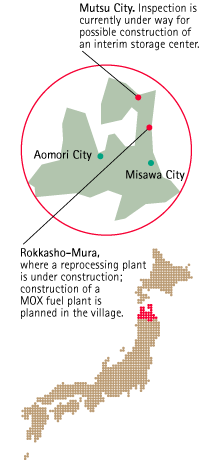Interim Storage Facility Field Survey
The amount of spent fuel produced by Japanese nuclear power plants
will slightly exceed the capacity of the Rokkasho reprocessing
plant. Spent fuel is currently stored in storage pools at nuclear
power plants; at the present rate, these storage pools will reach
capacity in the near future. Therefore there is a need to construct
an off-site facility in which spent fuel can be properly stored
and managed until it can be reprocessed. In November 2000, Mutsu
City, Aomori Prefecture, asked the Tokyo Electric Power Company
(TEPCO) to carry out a field survey to examine whether an interim
storage facility could be constructed in the city. TEPCO is complying
with this request and will begin a one-year field survey in April
2001. TEPCO plans to bring an interim storage facility into operation
by around 2010. If 500 spent fuel casks — extremely reliable
steel containers capable of safely and hermetically sealing spent
fuel, removing heat, shielding radiation and preventing criticality
-- are to be stored in this facility, it is estimated that the
facility will require a 100,000-square-meter site. Upon completion
of the interim storage facility, increased flexibility will be
achieved within the entire nuclear fuel cycle.

Conclusions
 Japan's
nuclear policy is to implement the MOX utilization program; that
is, to carry out the application of MOX fuel in light water reactors.
Because of the fact that discussions are still under way with
the local government, the commercial use of MOX fuel has not yet
started. Nevertheless, as mentioned at the outset, Japan, scarce
in energy resources, is continuing its policy of establishing
a nuclear fuel cycle. The Japanese electricity industry intends
to continue its efforts to garner support and understanding from
related parties in order to carry out the MOX utilization program
in accordance with this policy. Japan's
nuclear policy is to implement the MOX utilization program; that
is, to carry out the application of MOX fuel in light water reactors.
Because of the fact that discussions are still under way with
the local government, the commercial use of MOX fuel has not yet
started. Nevertheless, as mentioned at the outset, Japan, scarce
in energy resources, is continuing its policy of establishing
a nuclear fuel cycle. The Japanese electricity industry intends
to continue its efforts to garner support and understanding from
related parties in order to carry out the MOX utilization program
in accordance with this policy.
In promoting the use of plutonium, Japan is determined to live
by the peaceful use principle in accordance with the Atomic Energy
Basic Law, and to act from the principle of not possessing surplus
plutonium. Japan is also determined to use plutonium while taking
stringent accountancy measures, along with physical protection
and containment surveillance measures, including the adoption
of the wide-ranging safeguards set forth by the International
Atomic Energy Agency (IAEA). |